Gone are the days when search marketers optimized keyword-stuffed articles hoping to rank higher for their targeted keywords. As the search algorithms evolved to detect these black-hat techniques, marketers had to change their strategies and abandon this practice entirely. Now, quality content marketing is a buzzword that is steadily flooding the digital marketing scene with many brands joining the bandwagon. Content marketing is very valuable and serves as a common strategy that almost every website uses.
Those who have been involved in content marketing over the past few years have probably heard the phrase “semantic search,”; it is not a new concept. Semantic search will continue to shape the way marketers build their content strategy. So, understanding the future of semantic search will allow you to optimize your articles for a specific intent and achieve success in the SERPs.
To help you get a good grasp of semantic search and how to best use it for content creation, we invited Dido Grigorov, an SEO specialist, a semantic search and content marketing professional, CEO and founder of NetPresenta, to our SEMrush Chat.
He and our other chat guests shared their opinions on the biggest challenges of semantic search:
Q1. What do you think the biggest problems/challenges of semantic search are?
Understanding the search intent behind a particular query.
This can be a daunting challenge because you are trying to get into your users’ heads and determine what they mean when they are typing a query. The user intent of a keyword is their goal, and it usually falls into three main categories:
They want to learn something.
They want to do something.
They want to go somewhere.
A1 A big challenge to semantic search is determining the intent of a particular search query and making sure content matches #semrushchat
— PolePositionMkg (@PolePositionMkg) July 19, 2017
Each search query that a user types into Google is essentially a question that reflects the intent of your audience. Understanding what they are asking for will help you to create content that will give your users what they want.
Focusing on users, instead of search engines.
Instead of focusing on search engines and constant algorithm updates, site owners need to shift more of their attention to their users. Many marketers don’t integrate user behavior into their content marketing campaigns. They focus solely on keywords in the search queries. It is obvious that keywords are extremely important because people use them when searching for something. However, what is even more important is what they want to find. Site owners need to understand the searcher’s real intention behind those keywords.
A1: Seems like the biggest challenge will be to get SEOs to stop chasing the algo, and start chasing users again. 1/2 #semrushchat
— Carolyn Lyden (@Carolyn_Lyden) July 19, 2017
A1: Sometimes a users intent is not always what it seems. User intent is defined by the user not the machine #semrushchat
— Corey (@CoreyW85) July 19, 2017
Localization
Depending on which regions and cities you are targeting, you also need to take into consideration regional dialects and colloquialisms when performing a keyword research. For example, “ pop,” which is a soft drink in the American Midwest, is called "soda" in the Northeast and West Coast.
A1: Sometimes when hyperlocal we focus on a regional or similar colloquism. Here in Chicago: Soft Drinks, Soda Pop and Pop. #semrushchat
— Viable Operations (@viabledigital) July 19, 2017
A1: I feel like regional slang can confuse things. Like when I lived in Michigan and everyone called it 'pop'... whut? #semrushchat
— Sarah Nelson (@Blogging_Geek) July 19, 2017
Avoiding Old Practices
Some marketers are still sticking to outdated practices that are no longer useful. If you have multiple target keywords, there is no sense in optimizing one webpage around a single keyword. In this video, Brian Dean explains how to properly optimize your page for multiple keywords.
A1. Old habits die hard. The difficult part is putting it into practice and not optimizing a page for a single KW #semrushchat
— Matthew Young (@MatthewAYoung) July 19, 2017
Lack of Experience
Dido Grigorov - @DidoGrigorov says that some website owners and search marketers don’t have enough expertise in optimizing sites for semantic search.
#semrushchat A1: Proper optimisation of the website for semantic search + it's still not that well understood by the website owners.
— Dido Grigorov (@DidoGrigorov) July 19, 2017
There are many things you need to pay attention to if you are looking to embrace semantic search. To ensure that all your content is relevant to your readers and can easily be found in the search engines, you need to understand related terms and how to use both structured and semantic data.
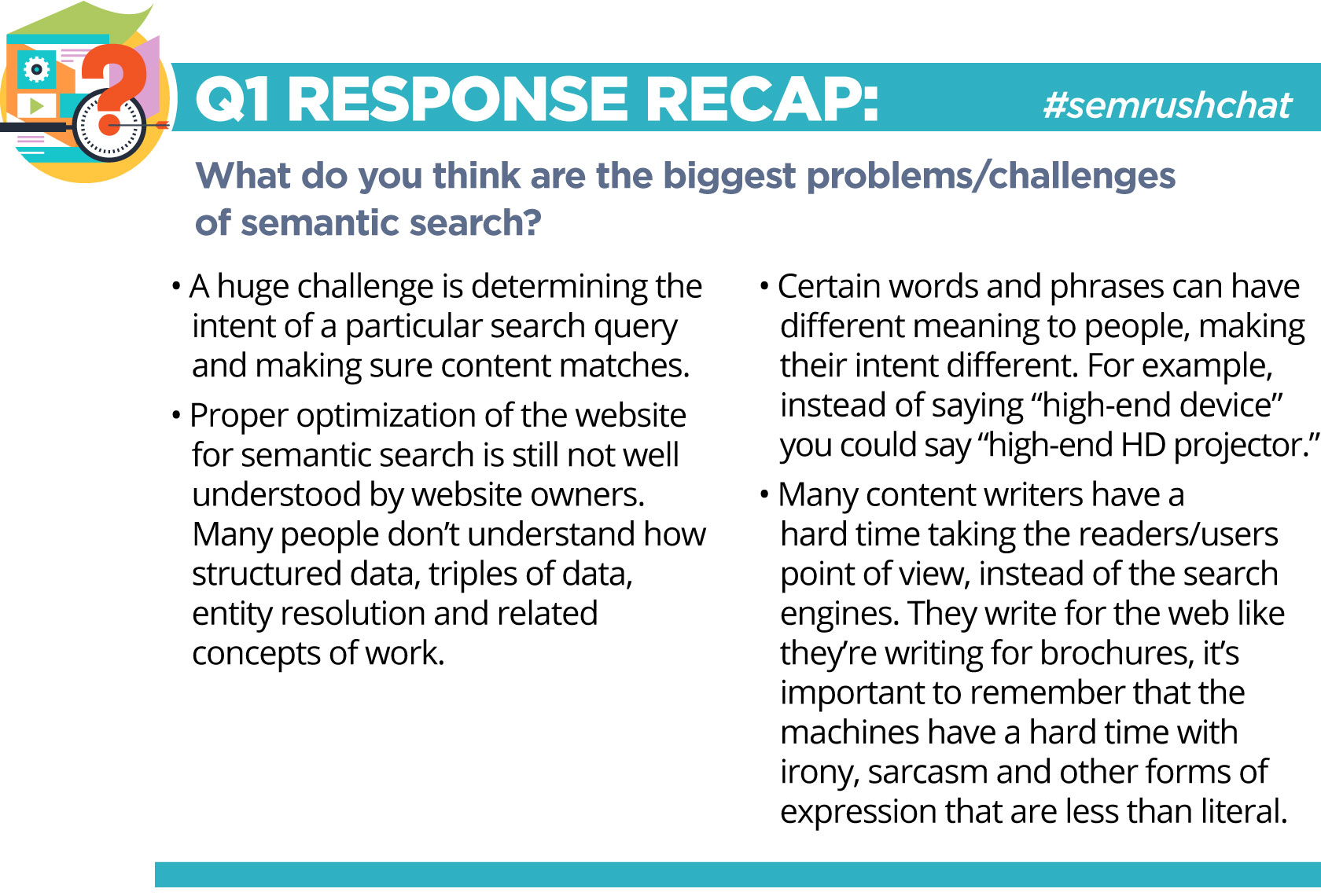
To adapt your content strategy to semantic search, you need to better understand the real meaning behind the questions your users ask, and what motivates them to search for a given topic.
Q2. What's the best way to create content that is in line with semantic web, the arrival of voice search and Google RankBrain?
The digital landscape is rapidly evolving to meet the needs of the online audience. All of these changes are shaping the way that people interact with digital content and better understand how users are performing search queries. This is why Google developed RankBrain, a machine learning technology that is used to help Google process the search results.
Another big trend is the growing popularity of voice-search enabled digital assistants, such as Apple’s Siri and Microsoft’s Cortana. ComScore estimates that by 2020 50% of all searches will be voice searched.
As a content marketer, you need to adapt to these changes and learn how to optimize each piece of your content for Google RankBrain, voice search, and semantic web. Here are five tips from our chat participants that will help you create content that meets the challenge:
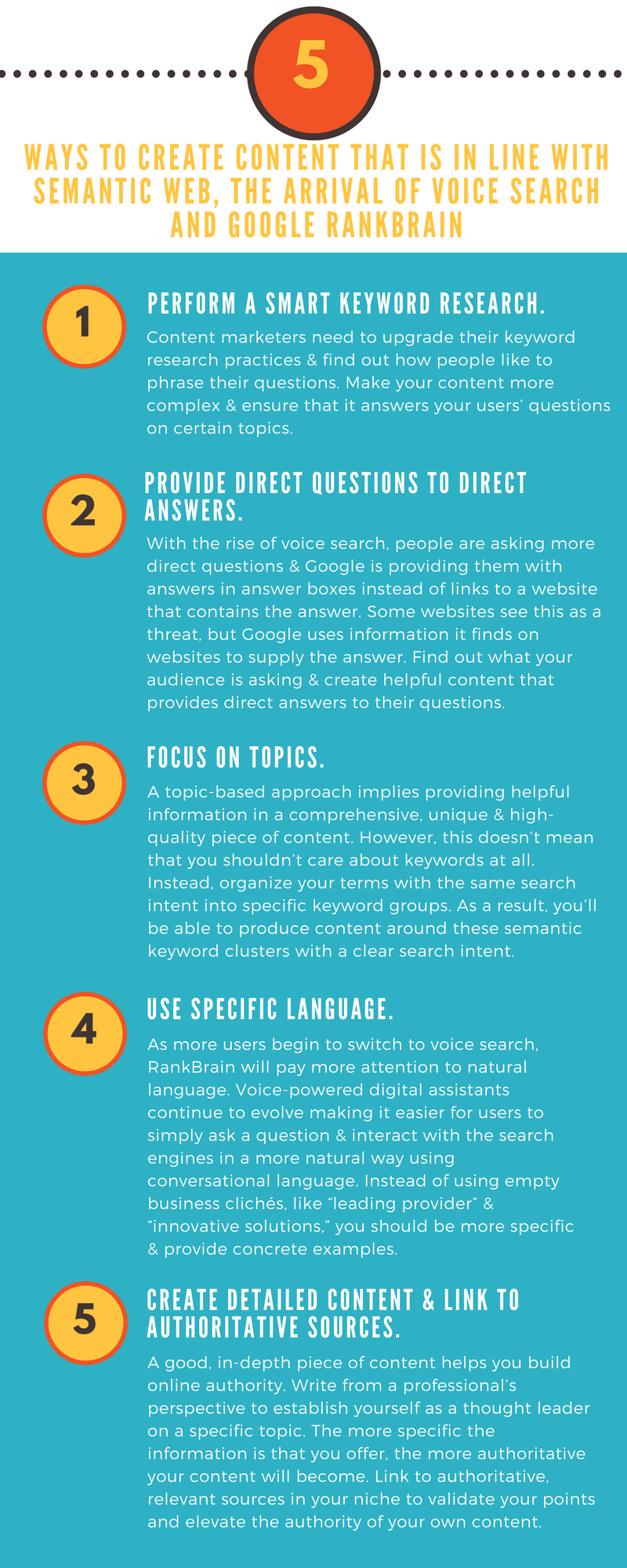
Special thanks to everyone whose tweets we used to make this image: @DidoGrigorov, @Carolyn_Lyden, @MattLacuesta, @rsj8000, @R8chel_Marie, and @bright_local.
To find out more on the topic, you can also check out how to write SEO content to appease Google RankBrain.
Q3. In your opinion, do you think that Google’s switch to semantic search influences the way content marketing is done?
Today search engines aim their efforts at understanding the semantic meaning behind the keywords users type into the search box. Rather than viewing the query merely as a string of individual words and displaying sites that have the most matches to those words, semantic search urges Google and other search engines to dig deeper into the meaning of the phrases people use and provide results based on this information. So, how does semantic search influence the way marketers develop their content marketing campaigns?
Content is becoming more user-centric. This means that content marketers now care more about people who consume the information that they provide.
@semrush #semrushchat A3:Yes absolutely! Content marketing now is more user-centric, not machine-centric, which also means more conversions.
— Dido Grigorov (@DidoGrigorov) July 19, 2017
Aside from focusing on quality, create content that is responsive to customer feedback and isn’t treated solely as a sales opportunity.
Today, brands care more about how their content makes their audience feel. Content that is written by humans for humans resonates better with your readers.
A3: Definitely. Content is more human, which resonates better with consumers. We're writing to people now instead of robots. #semrushchat
— Sarah Nelson (@Blogging_Geek) July 19, 2017
The more you get to know your audience and produce materials targeted specifically at them, the more benefits you can get from your content marketing efforts. That is why more content is now written specifically for a certain demographic. When writing for a larger audience segment, you have an opportunity to reach out to a higher number of readers. However, this can decrease the relevance of your content and can lead to lower conversion rates. You may want to consider focusing on one specific demographic, choosing relevancy over volume.
A3. User expectations have changed. Google NEEDS us to keep up; a search engine without relevant, quality results won't last! #semrushchat
— Louise Dickens (@_LouiseDickens) July 19, 2017
You have probably heard the phrase “content marketing is the new SEO.”
a3. Not so sure about content marketing (new name for SEO?) but has influenced SEO by making more content-focused. #semrushchat
— Marianne Sweeny (@msweeny) July 19, 2017
A3 It's legitimized content marketing as a partner to technical SEO. Websites are getting better as publishers respond. #semrushchat
— JoMarie (@JoMarieT) July 19, 2017
Even though content marketing and SEO are two different aspects, they overlap a lot. Launching a page on your site and optimizing it solely for SEO isn’t going to cut it anymore; your content marketing will be successful only if it takes into account SEO features. Even the most brilliant content will not go anywhere unless people are able to find it. To make it easier to find, you need SEO.
A3. Definitely! Optimizing for the user vs the search engine won't be separate elements anymore #semrushchat https://t.co/iJcOOPuhvF
— rebecca (@rebeccalajoie) July 19, 2017
A3: Absolutely. Whether we like it or not, we want to show up on Google so we tend to do what it takes to make that happen. #semrushchat https://t.co/oyiAkPoWeU
— ThinkSEM (@ThinkSEM) July 19, 2017
As a content marketer, you need to keep in mind the following things:
Thorough research enables you to collect a list of direct questions that your audience may ask. This will help you write content that answers those questions and provide self-contained information.
Instead of aligning a specific phrase with one page, try to create multiple pages dedicated to a certain topic. Andy Crestodina names these pages around a specific topic, “ content hubs,” and explains that this tactic is the key to winning the attention of your audience in a crowded digital field.
Use clear, simple language. This not only makes your content easy to read but can also help users find your content faster.
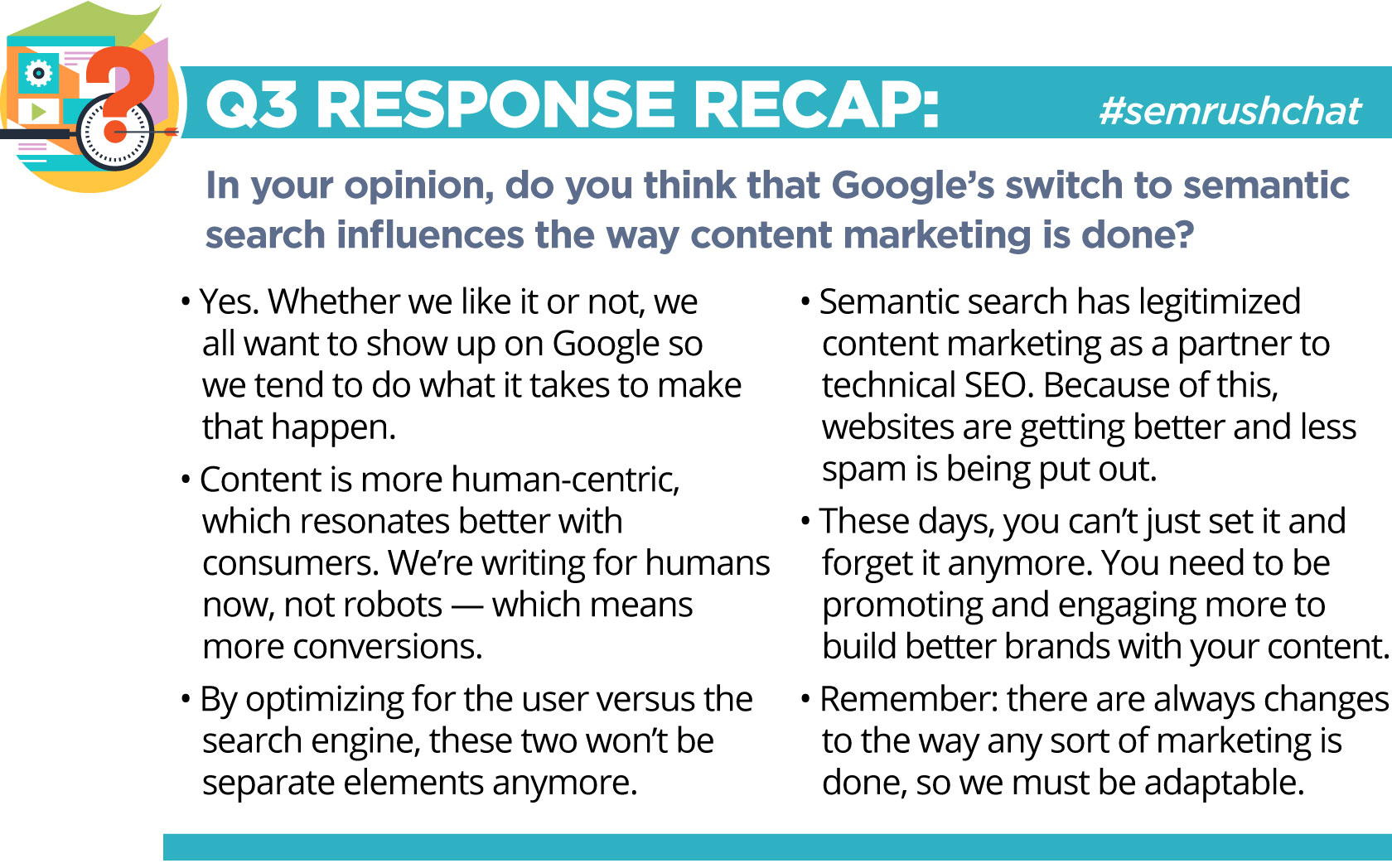
Does semantic search influence your approach to content marketing? Please share your thoughts in the comments!
Q4. How will Google’s semantic search impact the search results in finding publishers’ content websites?
Semantic search is definitely changing the search's landscape. With RankBrain and voice search taking hold, semantic search takes on a new significance for content publishers and content ranking.
Google continues to roll out updates to its algorithms and experiment with the SERP layout. As a result, marketers need to understand how other elements (e.g., Knowledge Graph, Local Pack, Answer Box, etc.) on the search page can influence content ranking.
A4: The Knowledge Graph comes into play here. If they created quality content it will be easier to find in the graph. #semrushchat
— Netvantage Marketing (@netvantage) July 19, 2017
Today, the best search results aren’t those that contain a lot of keywords. Instead, the most relevant webpages are those that align with the intent of searchers. Semantic search saves users’ time and provides better search experiences. As semantic search across the web becomes smarter, it is getting easier for people to get the information that they are looking for.
A4 The Web becomes a big database, with answers spread across more than one site, as pages become semantically connected. #SEMRushChat
— Bill Slawski (@bill_slawski) July 19, 2017
Understanding how semantic search works allows content creators and publishers to effectively leverage it. Here is a quick list of three things they need to do to take an advantage of semantic search:
1. Optimize for user intent. As stated earlier, in the time of semantic search, user intent is more important than ever.
A4: That depends on the user and the intent of the search. Semantic can really help boost the visibility of a publisher. #semrushchat
— Danny Ray Lima (@dannyraylima) July 19, 2017
2. Align SEO with your social media campaign. Today, social media plays a critical role in the search results, and social search is becoming more powerful because social networks send strong signals to the search engines. This means that you need to address your social audience and their interests as well. By producing content that covers those topics of interests, you can create a more targeted content strategy.
#semrushchat #a4: #SocialMedia signals are essential to #SemanticSearch- and why #InboundMarketing #WEB campaigns MUST BE *COORDINATED.* https://t.co/U6PFcSpF9I
— Alex Singleton ? (@theAJSingleton) July 19, 2017
For some social media networks, you can markup your content with metadata to improve the way it is displayed, i.e., Facebook Open Graph and Twitter Cards.
3. Don’t focus on keywords, instead, focus on the meaning of your content. Even though keywords still matter, your content should be focused on a clear topic, because Google now looks for meaning rather than specific terms.
@semrush #semrushchat A4: Publishers with the best content will be rewarded. They will be put into the elements of Knowledge Graph.
— Dido Grigorov (@DidoGrigorov) July 19, 2017
The search landscape continues to change, which forces publishers to give their audience the best experiences possible. Those who can align their content strategy with semantic search and take advantage of the opportunities it provides will be rewarded.
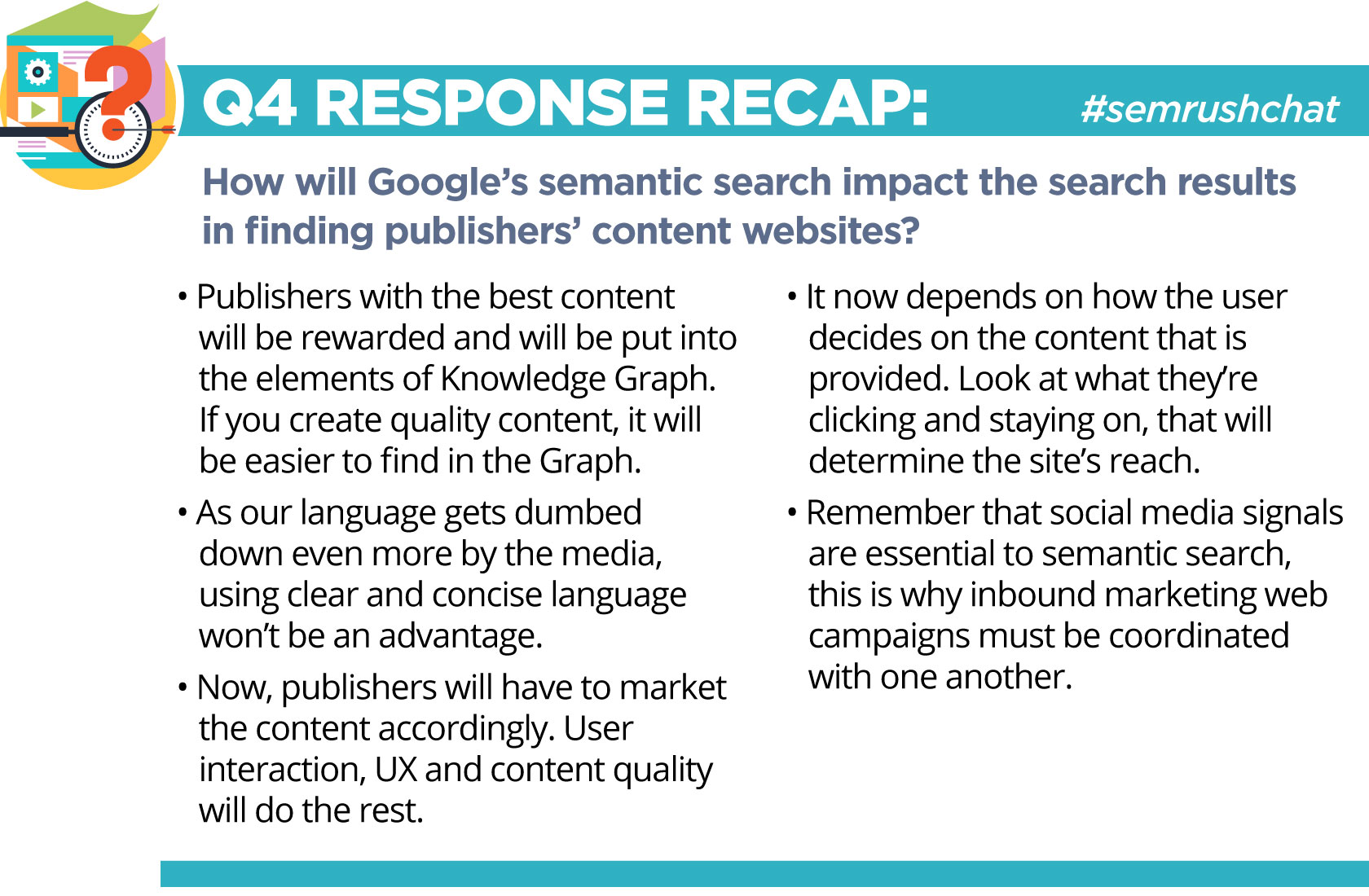
Semantic search is on the rise and should be understood by anyone who wants to make smarter content and SEO decisions.
Q5. What's the best way to get a featured snippet without using KWs in your content?
As mentioned earlier, the search engines are making it so users can get answers to their queries without having to click on any specific pages, which can lead to a drop in traffic for some websites. However, some site owners see it as an opportunity to become featured for free by Google. Here are some effective ways to get a featured snippet without using keywords in your content:
1. Know which questions your users ask and then answer them.
If you understand which questions users are asking in your industry, you will improve your chances of getting into the featured snippet position. Instead of focusing on broad queries like “content,” you should use long-tail keywords, such as, “how to plan a content marketing strategy” which looks like a question that your audience would likely type into the search box.
A5: Provide the best answer to a q your audience has. Structure content in a way that's easy 2 read (headers, bullets, etc.) #semrushchat
— Rachel Howe (@R8chel_Marie) July 19, 2017
To find out which questions your readers may ask, you can use Google autocomplete and related questions (or “People Also Ask) as an excellent source of keyword ideas. Answer The Public is another handy tool for discovering what people are searching for.
Once you get the idea what your audience may be asking, it’s time to tailor your content accordingly and provide clear answers to those questions.
2. Create a Q&A section on your site.
If you have more than one question to target, you may want to consider adding a Q&A section on your site. After analyzing more than 10 million keywords and 1 million domains, former SEMrush Data Scientist Qi Zhao suggested putting all related questions on the same page with properly formatted questions and answers. This will give you a good chance of getting a featured snippet. If Q&A or FAQ content is not the best option for your topic, you can use a good alternative, such as how-to pages.
@semrush @semrushchat A5 cont: Use structured data mark up, Use What, Why, How keywords, Think how people speak, make your content Q&A style
— Dido Grigorov (@DidoGrigorov) July 19, 2017
3. Use “snippetable” formats.
According to a study performed by Stat, there are three types of featured snippets: paragraphs, lists, and tables. Their findings showed an interesting point: paragraph snippets were most common, showing up in 82% of featured snippets. The majority of featured snippets you see pull information that is within the structured markup. All of these three formats provide clear and concise answers to questions and, in turn, improve the user experience.
A5: Provide content in "snippet-able" formats: lists, graphs, etc. Also, your CTR is *evidently* a huge factor. Work on that! #semrushchat https://t.co/RxNiXqrHSa
— ThinkSEM (@ThinkSEM) July 19, 2017
A5: Markup and putting it into a format the engines like. I've had success with bulleted lists rather than numbered lists #semrushchat
— Matt Lacuesta (@MattLacuesta) July 19, 2017
4. Use structured data markup.
The purpose of microdata is to describe content. Semantic markup helps the search engines to display more relevant results for the users. By implementing schema markup in your content, you improve your chances of getting rich snippets. To semantically mark your content properly, use Schema.org.
A5: IMO adding structured data in content can give a boost. @semrush 's featured snippet tool is great to find opportunities #semrushchat
— Danny Ray Lima (@dannyraylima) July 19, 2017
Let’s sum up!
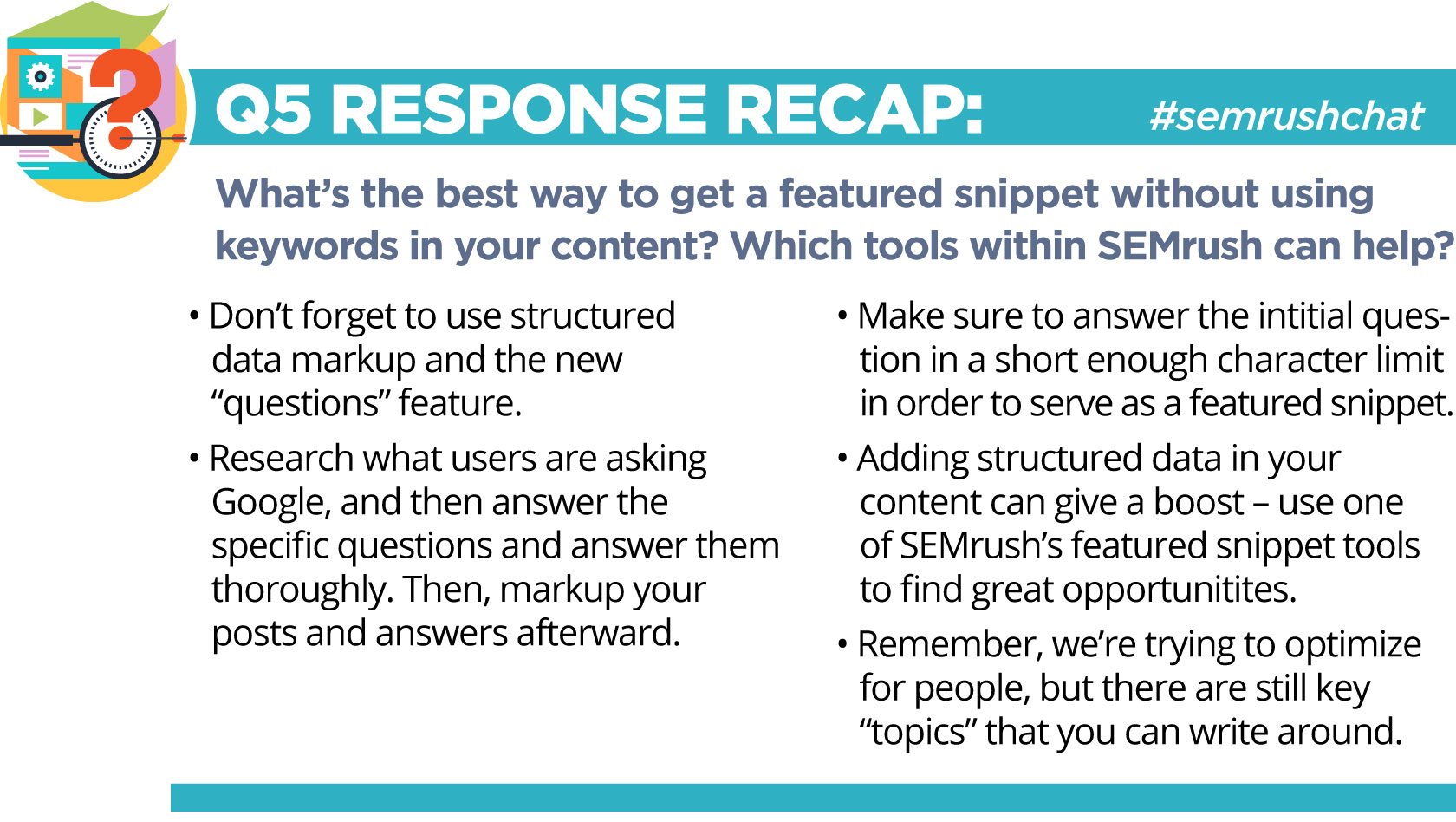
By understanding what you can do to produce content that is suitable for the featured snippet position, you can boost your online presence and make it much easier for your audience to find your content. We would like to thank Dido Grigorov and our other chat guests for sharing so many great tips for adapting your content in the time of semantic search.
Semantic search and content marketing #semrushchat from SEMrushMake sure to join us next week as we discuss “Concepts of Advanced On-Page SEO” with Jenny Halasz!
Innovative SEO services
SEO is a patience game; no secret there. We`ll work with you to develop a Search strategy focused on producing increased traffic rankings in as early as 3-months.
A proven Allinclusive. SEO services for measuring, executing, and optimizing for Search Engine success. We say what we do and do what we say.
Our company as Semrush Agency Partner has designed a search engine optimization service that is both ethical and result-driven. We use the latest tools, strategies, and trends to help you move up in the search engines for the right keywords to get noticed by the right audience.
Today, you can schedule a Discovery call with us about your company needs.
Source:




![How To Create a Strategic Dashboard in Excel Using Semrush Data [Excel Template Included]](https://new.allinclusive.agency/uploads/images/how-to-create-a-strategic-dashboard-in-excel-using-semrush-data-excel-template-included.svg)
